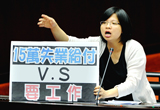ECFA won’t bring laborers: premier

Taipei Times | Saturday, Oct 17, 2009
ECFA won’t bring laborers: premier
‘INCORRECT’: A DPP legislator said WTO rules would mean that signing an ECFA with China would lead to trouble, but Wu Den-yih said that she was misinformed
Shih Hsiu-chuan
STAFF REPORTER
Premier Wu Den-yih (吳敦義) said yesterday that the government would not open the Taiwanese market further to Chinese agricultural products and would not allow the entry of Chinese laborers, while avoiding questions about how long the bans would be in place.
Wu and Ministry of Economic Affairs officials attended a legislative question-and-answer session yesterday dominated by discussion of the government’s plan to sign an economic cooperation framework agreement (ECFA) with China.
President Ma Ying-jeou (馬英九) has said the country plans to ink the ECFA by early next year at the latest. Wu said that economic officials had recently met Chinese Ministry of Commerce officials and produced an initial draft of the agreement.
Fielding a question from Democratic Progressive Party Legislator (DPP) Lin Shu-fen (林淑芬) on whether the ECFA would follow one of the six models of regional economic integration under the WTO framework, or resemble the Closer Economic Partnership Agreement (CEPA) between Hong Kong and China, Wu said none of the models was suitable for the ECFA.
“[The ECFA] will be an agreement based on the special situation regarding cross-strait relations under the WTO framework,” Wu said.
Minister of Economic Affairs Shih Yen-shiang (施顏祥) partly agreed with Lin, who defined the ECFA as an interim agreement on free trade under which parties must further trade with each other and open their markets to other WTO members outside the pact after the interim period to avoid trade sanctions.
“That the cross-strait ECFA will grant partial access to selective industries of each side is compatible with the spirit of the WTO, but we should be careful of saying that it is an interim free trade agreement for fear of narrowing its scope,” Shih said.
Lin urged the officials to inform the public of the possible impact an ECFA could bring after its interim period passes, as well as consequences the country would face if it then chose not to expand its market access as required by the WTO.
“You have only been telling the public about the initial benefits of the ECFA, but what comes next?” Lin asked. “The WTO caps the interim period at 10 years. After that, will you be able to keep [Ma’s] promises that Taiwan will not open its market to Chinese labor and the currently prohibited 836 agricultural products?”
WTO regulations stipulate that after the interim period is finished, the market access of parties to interim agreements on free trade must be extended to include a majority of trade merchandise and service industries, Lin said.
Wu and Shih failed to answer the question directly.
Shih said the 10-year cap as described by Lin was “incorrect.”
Citing conclusions of an assessment conducted by a weekly on the impact of an ECFA on the country, Lin said the pact would be “Viagra for the rich” and “a landslide for the poor.”
Wu disagreed, saying: “Studies have shown the benefits of signing the ECFA will outweigh the drawbacks.”
“More than 200,000 or 300,000 people will benefit [from the ECFA], while the worst-case scenario would see about 80,000 people put at disadvantage,” Wu said. “Since the ECFA will push Taiwan toward a positive development, we should try to maximize its benefits and minimize its harm … for example, extending the duration of unemployment pensions to laborers losing jobs because of this and helping affected industries upgrade.”
Chinese Nationalist Party (KMT) Legislator Chang Chia-chun (張嘉郡) asked Wu how long the government could keep its promise not to open Taiwan’s market to Chinese laborers and the banned agricultural items.
“Is it one year, two years, or 10 years?” Chang said.
Wu said: “We will surely hold the bottom lines [regarding the restrictions on imports of more agricultural products and Chinese labor], and [China] will understand.”
Chang then said: “Everyone is feeling anxious [about the ECFA] as the government hasn’t told the public clearly what the ECFA is. The Council of Labor said the number of local laborers affected by the ECFA would be 80,000, the Ministry of Economic Affairs said 105,000, and the Council of Mainland Affairs said both estimates were wrong.”
Wu reiterated that the government would prioritize the interests of Taiwan and the well-being of Taiwanese.
“There is a Western saying that optimists see a rose’s petals, but pessimists see its thorns. As a government, we have to see the flower and the thorns, which means we will take care of the risks when seeing opportunities,” Wu said.





